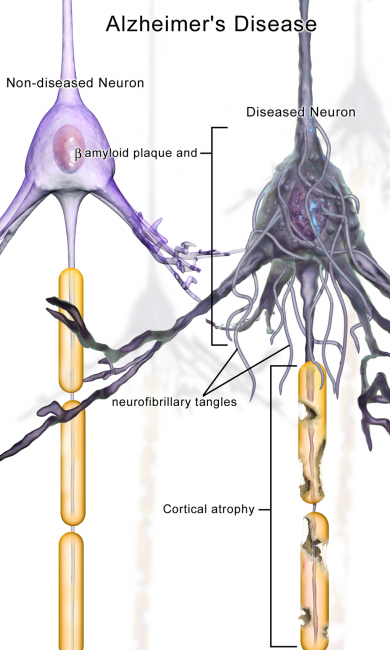Effects of Alzheimer’s Disease

More than 10% of the population over 65 years and 50% over the age of 85 years suffer from Alzheimer’s. It has been estimated that nearly half of people are mis-diagnosed with Alzheimer’s, this information is gained at autopsy. Those assumed to have the disease may actually have other forms of dementias caused by simple treatable conditions like dehydration, intoxication from prescription drugs, food allergies, nutrient deficiencies and depression. Mercury and aluminium excess in the brain is associated strongly with Alzheimers. Magnesium will help detoxify the effects of heavy metals, even ones as poisonous as mercury. If Magnesium is deficient in the brain, aluminium is able to replace it, mimicking its function and causing harm. This leaves calcium channels open in the brain nerve cells, allowing it to flood in causing cell death.
From my personal experience, my late Mum was thought to have some type of dementia. After losing Dad, she went downhill fast and started exhibiting all kinds of worrying traits. She was always very astute, intelligent and sharp. She was a member of Mensa being one of only 3% who had the highest IQs. Her forgetfulness, confusion and strange behaviour worried the whole family and we came to the conclusion Mum was suffering from some kind of dementia.
What we didn’t realise was that she had stopped taking her medication of thyroxin whilst Dad was ill. She was so determined to do the best for him that all her own welfare went out the window and thinking back we realised that she had started losing her memory before Dad actually died.

If you are on thyroid medication, it is one of those meds. you have to keep taking. If you stop, you are likely to feel OK for a while, then slowly start getting tired and wanting to sleep all the time, losing mental facalties and eventually you could fall into a coma. Once on this drug, you are probably on it for life.
I’ve put this little story in about Mum because there must be many worried relatives who are stressing over a loved one showing signs of dementia, which could instead be what’s known as Pseudodementia or even just dehydration and nutrient deficiency. Pseudodementia is where a person gets depressed like my Mum obviously was after losing Dad. Her cognitive impairment was mistaken for dementia. Symptoms include, loss of interest, suicidal feelings, withdrawal socially, loss of appetite and sleep disorders. Also there will be a difficulty making decisions and thinking clearly, confusion and trouble concentrating.
This condition is not permanent if treated for the depression that it is and Mum brightened up when she was lightly medicated for the condition. I do regret, though, not knowing about the benefits of magnesium at the time. This would have helped her greatly if we had supplemented her diet. She always complained of aching legs and back ache. She often had head-aches and was always lacking in energy. The anti-depressant she was prescribed helped her become a happier person but still she suffered with these aches and pains which could have been alleviated with magnesium and made her later years more comfortable and enjoyable.
If you have an elderly parent showing these symptoms, please consider helping them with a supplementation of Mg. Using Mg Chloride is IMHO the most efficient way of getting Mg into the body because it is immediately bio-available. Mg Chloride can be taken orally or applied topically. If your loved one would prefer, a foot bath with Mg Chloride can be suggested (1 cup of Mg Chloride flakes to approx 5 litres of water, enough to cover the feet and soak for 20 minutes). This should be done as often as possible, once a day would be great but at least 3 times a week would help. By far the most convenient method of supplentation is taking Mg Chloride orally. Start by taken 1/2 teaspoon of Mg Chloride such as ReMag (there are a few on the market) in a glass of 250ml (1 cup) of water and add a dash of cordial – blackcurrant, lime or strawberry works well but don’t use ‘light’ cordials, no aspartame please! Twice a day is the recommended dose. Why the cordial? Mg Chloride has a salty taste rather like seawater and cordial takes it away nicely. I myself don’t mind the taste but it depends on your palate.
If your loved one has been diagnosed with Alzheimer’s or Dementia, try Mg Chloride, it is innocuous and you may find the symptoms will subside.